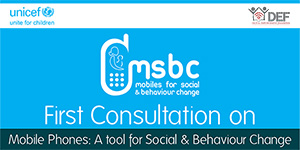
The rapid growth of mobiles and the Internet have changed the way in which communication and development are taking place globally. It is strongly perceived that mobile, as a tool for social and behavioural change is an emerging area of importance among stakeholders in communication for development space. The development challenge is how to place mobile tool at the heart of solving key communication related hurdles in areas of education, health, livelihood and environmental disasters.
Mobile Phone as a Tool for Social & Behaviour Change’ is a joint effort of UNICEF India and Digital Empowerment Foundation (DEF) to explore various projects where women, adolescent girls and youth have effectively used mobiles in areas of health, education, sanitation, environment and monitoring and training of frontline workers. Trying to examine the prospects of Mobile Phone as a Tool for Social & Behaviour Change, DEF and UNICEF India organised a two-day consultation on, 9th and 10th May 2013 in New Delhi.
The project is now in its second stage. The second part of the project attempts to scale up at a wider level and provide solution-based tools to various on-going challenges surrounding the issue of women, adolescents, youth, girls, children and sectors across health, education, nutrition, and empowerment. This project attempts to study concerns around MSBC and create a formidable platform to provide knowledge on diverse MSBC implemented projects and help in developing partnerships between state governments and MSBC players. In attempt to do so, consultations will be organised in 5 Indian cities – Madhya Pradesh; Tamil Nadu; Uttar Pradesh; and Assam. The first consultation is due to be held on the 17th and 18th June in Bhopal. The consultation will be intervening practices in three categories – “Information Dissemination”; “Monitoring & Tracking”; and “Training of Frontline Workers & Interpersonal Communication”.
The consultation will represent over 70 participants representing mobile stakeholders from each group – government, civil society, device, telecom and VAS players. In a two-day programme, they will share the impact of the mobile-based practices. Participants will be divided into small groups and they will try to assess the potential of the different interventions to be adopted for implementation and scale up; and explore the scope of partnership building and collaborative work amongst government, private, bilateral agencies, CSOs and others in mobiles for SBC.
The consultation will also help in developing a roadmap on way forward to support state initiatives that includes tentative cost (human, financial, and technical) resources and to advocate on mobiles for SBC, engaging central and state governments, relevant departments and agencies.
To know more about the consultation and the programme, access www.msbcindia.org






